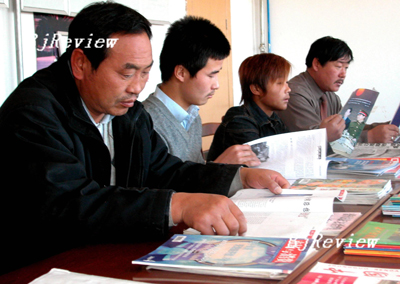|

Sunshine Policy Makes Difference
By November 30, 2007, in Beijing alone, 317 official trips abroad were reportedly cancelled because they covered no substantial programs.
Although the Foreign Affairs Office of the Beijing Municipal Government has further improved the system covering official outbound visits and has curtailed many trips, 6,293 delegations were still approved, almost the same as the previous year. What criteria go into determining what is an official trip or not are unknown to the public, something that has inevitably given rise to people's suspicion.
Originally, overseas trips were arranged for officials to get a better understanding of the outside world and learn advanced governing expertise. Gradually, it seems that such trips have become the "privilege" of some officials, and the objectives of the trips have morphed from being work-related into personal shopping and business jaunts. If a so-called official trip abroad is not approved, either the trip is actually not for government business or such trips are absolutely unnecessary. Internal supervision within the government system is not enough. It is important to be transparent about the objectives, itinerary and expenses of these trips to the taxpayers and bring them under public supervision.
Workers' Daily
Rural Cultural Life Needs Boost
According to a report on China's public cultural development issued by the Research Center for Humanities of the Chinese Academy of Social Sciences, increased government allocations in cultural undertakings have failed to reverse the downtrend of public cultural service organizations. This is especially the case given that in the past six years China has witnessed the disbanding of about 5,000 township culture centers.
The absence of cultural services at the grassroots level is deteriorating the rural population's quality, the report says.
Given China's current economic condition, it's not easy to provide adequate public cultural services to the entire rural population, but it's unacceptable that so many township culture centers have vanished in such a short period. It often happens that in the vast rural areas, farmers have trouble accessing books or newspapers when they desire to read.
Many local governments pay little attention to the public's cultural life and thus their financial support in this regard is very limited. Culture centers are an important--and sometimes the only--place for the rural population to enrich their lives, so it's necessary to preserve existing township centers and build new centers in regions where conditions allow.
Dazhong Daily
Eager to Contribute
Since the official website of the National Bureau of Corruption Prevention was launched on December 18, 2007, a flood of visits have paralyzed it several times. However, this paralysis is a true reflection of the people's passion for the government's anti-corruption efforts.
The over 1,000 posts on the website show that the public are eager to see a well-developed anti-corruption system and the establishment of a sound supervisory network to oversee anti-corruption work.
The people's rush to express their ideas proves that the public has a firm belief in the government's determination and capability to root out corruption, so it's important to protect and encourage their enthusiasm in this regard.
However, the website crash also reflects that there are not enough channels for people to contribute their information and wisdom in the fight against corruption. In the following years, it is crucial to make it easier for people to get involved in this important battle.
Dahe Daily
It's Our Turn to Take Action
Last December, French telecom equipment maker Alcatel-Lucent was fined $2.5 million by the U.S. Justice Department for bribing Chinese officials in the form of lavish trips to the United States in exchange for contracts worth multimillion dollars.
The trips, including sightseeing trips to Las Vegas, Disneyland and the Grand Canyon, were provided between 2000 and 2003 by Murray Hill, N.J.-based Lucent Technologies, prior to its 2006 acquisition by Alcatel SA.
Most of the trips, according to the U.S. Justice Department, lasted for two weeks and cost $25,000-55,000 each.
In order to make inroads into the lucrative Chinese market, multinationals are likely to take risks bribing concerned officials. In the past decade, China has seen a rising number of cases of this nature, connected with international trade and multinationals.
In the Alcatel-Lucent case, undoubtedly, the U.S. side is the beneficiary, as the company creates profits that filter back home. But being busted in its home country shows that the U.S. Government won't tolerate these corrupt practices and the so-called hidden rules of the game in China. This is a wake-up call to China. It is also time for the Chinese judicial system to do something to deter officials from taking bribes that can come back to bite the domestic market.
The Beijing News | 